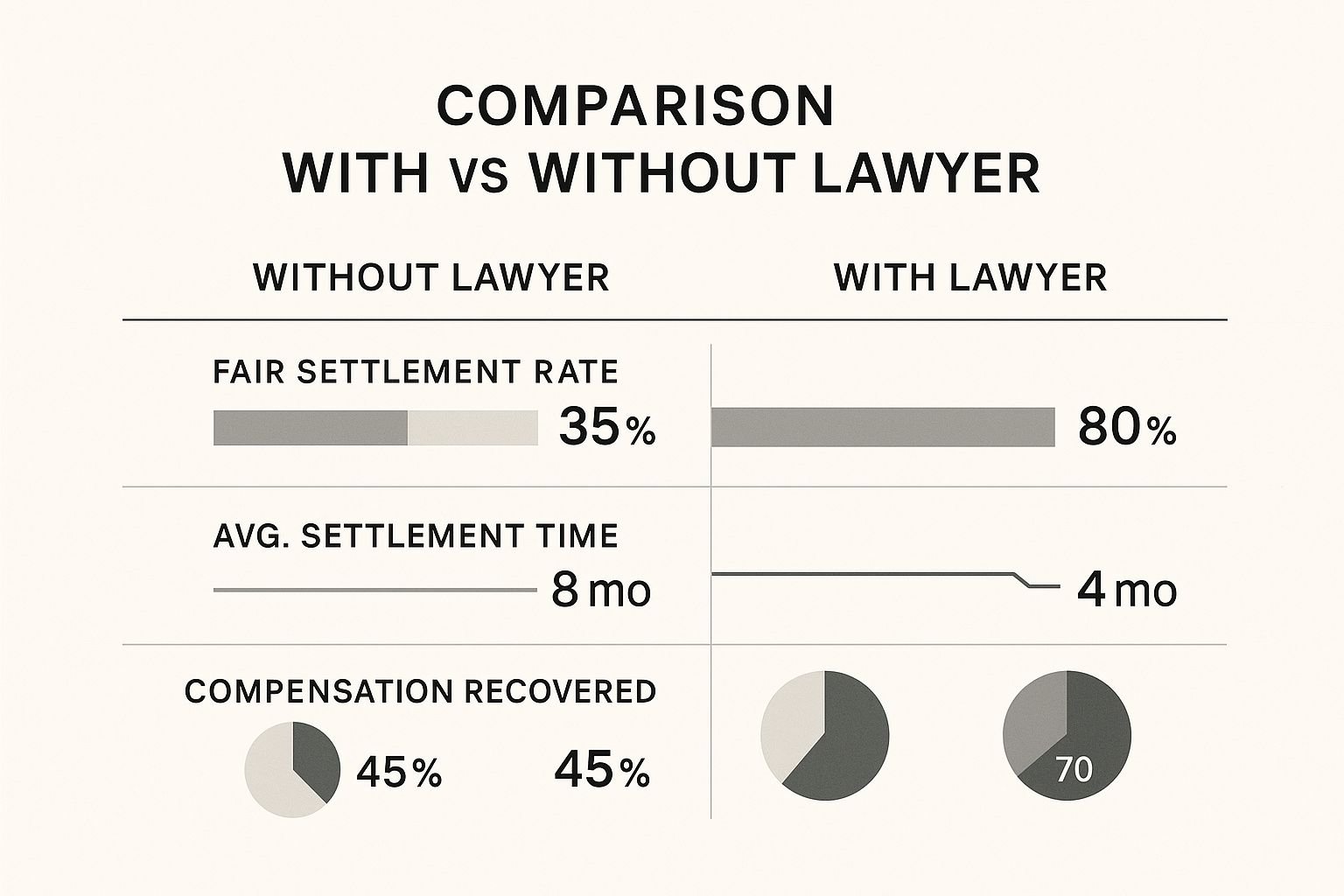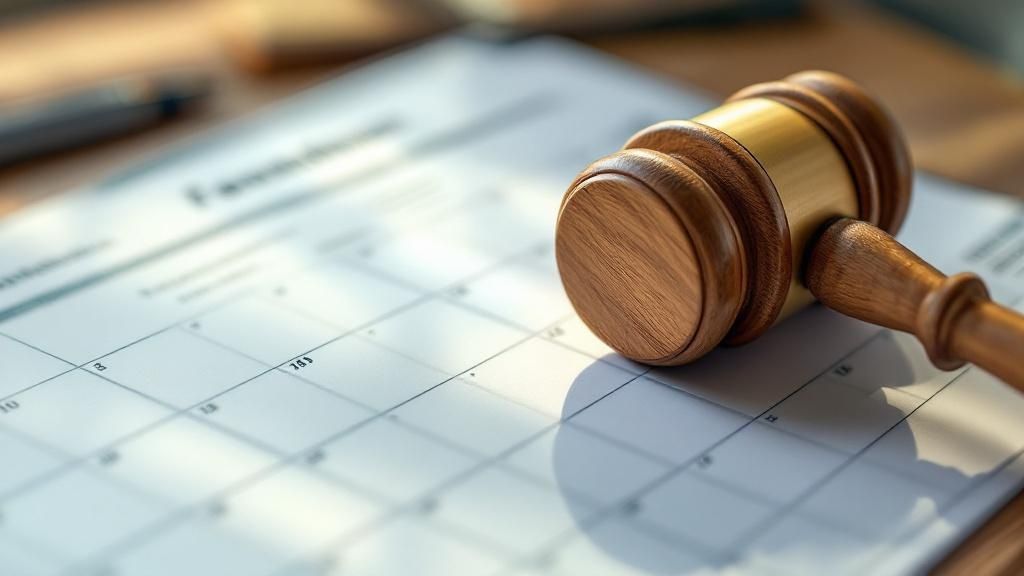When to Hire a Personal Injury Lawyer
"I was satisfied once John Bell took over my case."
"Communication was always timely."
When to Hire a Personal Injury Lawyer
If you’re wondering when to hire a personal injury lawyer, the simplest answer is right away. You should call an attorney immediately after any accident that leaves you with a significant injury, involves a fight over who's at fault, or results in a lowball offer from an insurance company. Waiting is one of the biggest mistakes you can make—it can seriously hurt your case and reduce the compensation you deserve.
Critical Signs You Need a Personal Injury Lawyer Now
After an accident, everything can feel overwhelming. You’re trying to heal, juggling doctor's appointments, and watching bills pile up. The last thing you want to add to that is a fight with an insurance adjuster. But some situations are clear warning signs that you need to get a legal professional on your side. Think of it as your "time to call a lawyer" checklist.
If any of these sound familiar, it’s time to pick up the phone.
The Severity of Your Injuries
The seriousness of your injuries is the first major indicator. Minor scrapes and bruises that heal in a few days probably don't need a lawyer's involvement. But if you’ve suffered an injury that is serious, permanent, or will require long-term medical care, you absolutely need an attorney.
These types of injuries include:
- Spinal cord or traumatic brain injuries (TBIs)
- Broken bones or complex fractures
- Any injury that needs surgery or a hospital stay
- Long-term disabilities that impact your ability to earn a living
In these situations, getting immediate medical attention with a doctor on call is crucial for your health. It also creates the medical records that become the foundation of your claim. A good lawyer knows how to calculate all your future medical needs and lost income to make sure your settlement covers you for life, not just for now.
Disputed Fault or Complex Liability
Another huge red flag is when the other person's insurance company denies their client was at fault or, even worse, tries to pin the blame on you. This is a classic insurance company tactic designed to pay you less or nothing at all.
Things also get complicated when multiple people are involved, like in a multi-car pileup on the highway. Figuring out who is responsible for what becomes a messy, tangled web. A lawyer can cut through the confusion by investigating the accident, collecting evidence, and building a solid argument that clearly shows who was at fault.
If you've been in a car crash, you might find our guide on why a lawyer is necessary for your auto accident case helpful.
This infographic paints a pretty clear picture of how different the journey can be when you have a professional in your corner.

As you can see, the numbers speak for themselves. Working with an attorney doesn't just improve your odds of getting a fair settlement—it dramatically increases them. It also tends to speed up the process and result in a much higher final compensation amount.
The difference between navigating an injury claim by yourself versus with an experienced lawyer is night and day. Let's break down exactly what that looks like.
Claim Management With a Lawyer vs Without One
| Investigation | Limited to your own resources and knowledge. | Professional investigation, including accident reconstruction and witness interviews. |
| Evidence Collection | You gather what you can, often missing key documents like police reports or medical records. | Lawyer systematically gathers and preserves all crucial evidence for your case. |
| Insurance Communication | You deal directly with adjusters trained to minimize payouts. | The lawyer handles all communication, protecting you from manipulative tactics. |
| Valuing Your Claim | Guesswork based on bills, often missing future costs and non-economic damages. | Comprehensive valuation based on current and future medical needs, lost wages, and pain and suffering. |
| Negotiation | You're at a disadvantage against experienced negotiators. | An expert negotiator advocates on your behalf, leveraging legal knowledge and experience. |
| Going to Court | An intimidating and complex process you must navigate on your own. | You have a skilled trial attorney ready to represent you and fight for your rights in court. |
Ultimately, trying to manage a serious claim alone often means leaving money on the table and enduring a lot of unnecessary stress. Bringing in a lawyer levels the playing field and ensures your focus can remain where it should be: on your recovery.
What a Personal Injury Lawyer Actually Does for You

Most people imagine hiring a lawyer means you're gearing up for a dramatic courtroom showdown. But that's not the reality for most personal injury cases. A trial is almost always the last resort, not the first step.
The real work—and the real value—of an experienced personal injury lawyer happens long before anyone sets foot in a courtroom. Think of them as your professional guide and advocate, handling every complicated detail of your claim so you can focus on one thing: getting better.
Your Investigator and Evidence Gatherer
As soon as you bring an attorney on board, they spring into action as your personal investigator. Their first priority is to preserve and collect crucial evidence that can easily disappear over time. This goes way beyond just getting a copy of the police report; it’s a comprehensive dive into the facts of your case.
An experienced lawyer’s investigative work includes:
- Documenting the Scene: They’ll often visit the accident site themselves to take photos and videos, looking for details an untrained eye would miss—like faded road markings or a problematic intersection.
- Securing Witness Statements: They know how to track down witnesses and get official, recorded statements while the details are still fresh in their minds.
- Collecting Official Records: This means gathering all the necessary paperwork, from police reports and 911 call transcripts to your complete medical records and employment documents that show lost income.
- Hiring Experts: For complex cases, they might bring in an accident reconstructionist to prove how a crash happened or consult medical experts to explain the long-term impact of your injuries.
This evidence-gathering stage is the bedrock of your claim. It turns your personal story into a solid, fact-based case that an insurance company can't just brush aside.
Your Shield Against Insurance Companies
One of the most vital roles your lawyer plays is acting as a buffer between you and the insurance adjuster. Adjusters are skilled negotiators, and their job is to protect their company's profits by paying out as little as they possibly can on a claim.
They'll often push for a recorded statement or dangle a quick, lowball settlement offer, hoping you’ll take it before you know what your case is truly worth.
Your lawyer takes over all communication with the insurance company. This is huge. It stops you from accidentally saying something that could be twisted to hurt your claim. This protection alone is a powerful reason why the best answer to when to hire a personal injury lawyer is almost always "right away."
Your Strategic Negotiator and Financial Analyst
Finally, a good lawyer meticulously calculates the full, true value of your claim. This is a far more complex process than just adding up your current medical bills. They look at every single loss you've suffered to make sure the compensation you seek is genuinely fair.
This detailed calculation includes:
- Current and Future Medical Costs: Everything from the initial emergency room visit to future surgeries, physical therapy, and prescription medications.
- Lost Wages: This covers not only the income you’ve already lost but also your diminished earning capacity if your injuries prevent you from returning to your old job.
- Pain and Suffering: This is the non-economic side of your claim—the real, human impact the accident has had on your daily life, your relationships, and your overall well-being.
Armed with a mountain of evidence and a detailed financial analysis, your attorney negotiates from a position of undeniable strength. They build such a compelling case that, in most situations, they can secure a fair settlement without ever needing to go to trial.
How the Type of Accident Shapes Your Timeline
Not all accidents are created equal, and the kind of incident you've been through dramatically changes how quickly you need to act. Think of it this way: a minor fender-bender is like solving a simple jigsaw puzzle. A medical malpractice claim, on the other hand, is like navigating a labyrinth in the dark—you need an expert guide from the very first step. The unique legal hurdles of each case set the clock ticking at different speeds.
Take a slip and fall in a grocery store. That wet floor or spilled product could be mopped up in minutes. Security camera footage that proves the hazard existed might be automatically erased in just a few days. If you wait to call a lawyer, that critical evidence could be gone for good.
A semi-truck accident is another beast entirely. These cases are far more complicated than a typical car wreck, involving a tangle of federal and state trucking regulations. You could have multiple at-fault parties—the driver, the trucking company, the maintenance crew, even the cargo loader. A lawyer needs to move fast to send a spoliation letter, which is a formal legal demand telling them to preserve crucial evidence like the truck’s “black box” data before it gets wiped.
Car Accidents vs. Medical Malpractice: A Tale of Two Timelines
The difference in urgency really comes into focus when you compare a standard car accident to a medical malpractice claim. While both can be devastating, the legal worlds they occupy are miles apart, and that directly impacts how quickly you need a legal expert in your corner.
Car accidents are unfortunately common, but the rules of the road are pretty clear. Figuring out who was at fault can sometimes be tricky, but it usually follows a well-established process.
Medical malpractice, however, is on a whole other level of complexity. It's not enough to show you had a bad result from a procedure. You have to legally prove that a doctor or hospital's care dropped below the accepted standard of care, and that this specific failure was the direct cause of your harm. This isn't something you can do on your own; it requires an immediate, in-depth investigation into dense medical charts and complex hospital procedures.
Proving medical negligence is an uphill battle from day one. It requires testimony from other medical experts, a deep understanding of healthcare law, and the resources to stand up to the powerful legal teams that hospitals and insurance companies employ. Delaying is not just a bad idea—it’s a mistake that can derail your entire case.
Why Success Rates Tell the Whole Story
The numbers don't lie. Looking at how these cases typically turn out makes it clear why getting a lawyer on board early for complex cases is so important.
When it comes to motor vehicle injury claims, plaintiffs have a relatively high chance of success. Studies have found that around 61% of plaintiffs get a favorable outcome, with most cases settling in about 14 months.
Medical malpractice claims are a much tougher fight. Plaintiffs in these cases win only about 19% of the time. That staggering difference comes down to the immense burden of proof you have to meet. You can learn more about these personal injury statistics to see the full picture.
The takeaway is simple: the more complex your situation, the sooner you need to lawyer up. For something as intricate as medical malpractice, the question of when to hire a personal injury lawyer is answered the very moment you suspect a medical professional made a mistake.
The Strategic Advantage of Acting Quickly

The moment an accident happens, an invisible clock starts ticking. This isn't just about feeling a sense of urgency; it's a real, critical window of opportunity that begins to close almost immediately. Waiting to get legal advice is one of the biggest mistakes you can make, because crucial evidence doesn't wait around.
Think of it like a footprint in wet sand. Right after it’s made, every detail is sharp and clear. But with every wave that washes over it—or in your case, every day that passes—the details fade until the impression is gone for good. That’s why moving quickly isn't just a good idea; it's a strategic necessity.
Preserving Critical Evidence Before It Vanishes
One of the very first things a lawyer does is lock down the evidence that will become the backbone of your case. Without that professional intervention, vital proof can disappear much faster than you’d think.
Immediate evidence preservation involves:
- Securing Physical Evidence: This could mean photographing skid marks on the road before they're washed away by rain, documenting property damage before it gets repaired, or getting ahold of a defective product before it's thrown out.
- Obtaining Witness Statements: Human memory is a funny thing—it gets fuzzy with time. A lawyer will track down witnesses and get signed statements while the details are still fresh in their minds.
- Retrieving Surveillance Footage: Security cameras at businesses or on traffic lights often record over their footage automatically. An attorney can send a formal preservation letter to make sure that crucial video isn't deleted.
By getting started right away, your lawyer builds a strong foundation for your claim from day one, giving you the best possible shot at success.
Navigating Strict Legal Deadlines
Beyond gathering evidence, there are strict legal deadlines that can completely prevent you from ever getting compensation if you miss them. In Oregon, the most important one is the statute of limitations. This law sets a hard deadline for filing a personal injury lawsuit.
The statute of limitations is a legal point of no return. Once that date passes, your right to sue is usually gone forever, no matter how strong your case might have been. A lawyer makes sure every form is filed correctly and on time, protecting your legal rights.
Figuring out the exact deadline for your specific case can be tricky, which is why having an expert guide you is so important. To get a clearer picture of these timelines, you can learn more about Oregon's personal injury statute of limitations in our detailed guide.
Unfortunately, far too many people wait. While industry data shows that injured people who do contact a law firm usually become clients within three days, a staggering 93% of potential clients never even schedule a consultation. That’s a huge number of people who risk losing their right to fair compensation simply by delaying. You can explore more about these trends in personal injury law on growlaw.co. The single best thing you can do to protect your claim is to act fast.
Why Hiring a Lawyer Usually Means Settling, Not Suing
When most people picture hiring a lawyer, their minds jump straight to tense courtroom dramas they've seen on TV. It’s a huge reason people hesitate to even make the call—the thought of a long, public, and stressful lawsuit is enough to make anyone think twice.
But that image is a world away from the reality of personal injury law. The truth is, the process is far more strategic and, frankly, a lot less dramatic. Deciding to hire a personal injury lawyer isn’t a declaration of war; it’s the smartest step toward getting a fair resolution, and fast.
The Power of a Well-Prepared Case
Think of a good personal injury lawyer less as a courtroom brawler and more as an expert negotiator. Their main job is to build a case so solid and backed by such convincing evidence that the insurance company sees a trial as a gamble they're almost certain to lose. When they're staring down that kind of risk, offering a fair settlement suddenly looks a lot more appealing.
A lawyer's real goal is to make settling the most logical, and frankly, the only sensible choice for the other side. They do this by digging into the details—gathering every piece of evidence, calculating the true cost of your injuries, and presenting a demand that's simply too well-supported to dismiss.
This is precisely why the vast majority of personal injury cases never step foot inside a courtroom. The idea that hiring a lawyer automatically means you’re going to sue is one of the biggest misconceptions out there.
The Numbers Don't Lie: Settlements are the Norm
The statistics back this up time and time again. Bringing in a lawyer is almost always the path to a negotiated settlement, not a drawn-out court battle. In fact, studies consistently show that around 90-95% of personal injury cases are resolved through a settlement long before a trial ever begins. This incredible success rate shows just how effective a skilled attorney is at getting you the compensation you deserve without needing a judge to decide. You can learn more about how often personal injury lawyers win on rsolislaw.com.
This trend is all about simple economics. Insurance companies are businesses, and their goal is to manage risk and protect their bottom line. A rock-solid claim from an experienced attorney is a major financial threat if it goes to court. Suddenly, offering a fair settlement isn't just about doing the right thing; it’s a smart business decision.
When you hire a lawyer, you're tapping into that dynamic and using it to your advantage to get a fair outcome.
Your First Free Consultation: What to Expect
Let's be honest, picking up the phone to call a lawyer can be nerve-wracking. You might be worried about saying the right thing or feeling pressured. But that first free consultation is anything but intimidating—it’s simply a conversation.
Think of it as a fact-finding mission for both of you. It's your chance to share what happened, in your own words, and get a professional opinion on your situation. The lawyer will listen and ask questions to figure out if you have a solid case. There’s no commitment, no fee, just a confidential talk about your options.

How to Prepare for Your Meeting
To get the most out of your time, it really helps to bring a few things with you. Having these documents handy gives the attorney a much clearer, faster understanding of your circumstances.
Don't stress about tracking down every single piece of paper, but try to gather what you can from this list:
- Police Report: This is the official rundown of the accident, if a report was filed.
- Medical Records: Any doctor's notes, diagnoses, treatment plans, or medical bills you have. These are incredibly important.
- Photos or Videos: Pictures from the scene, of your injuries, or of the damage to your vehicle can be powerful.
- Insurance Correspondence: Any emails, letters, or notes from conversations you've had with insurance adjusters.
Remember, this meeting is a two-way street. You're interviewing the lawyer just as much as they're learning about your case. Come armed with your own questions about their experience and how they'd approach a case like yours.
Finding the right person to fight for you is one of the most important decisions you'll make. For more on what to ask and what to look for, check out our guide on how to choose a personal injury lawyer. A little preparation goes a long way in making you feel confident and ready for what comes next.
Your Top Questions About Hiring a Lawyer Answered
Making the decision to hire a personal injury lawyer naturally brings up some very practical questions. Let's walk through some of the most common things people wonder about when they're in this situation.
How Much Does It Actually Cost to Hire a Lawyer?
This is usually the first question on everyone's mind, and the answer is reassuring. Nearly all personal injury lawyers work on what’s called a contingency fee basis.
In simple terms, this means you don't pay a single dollar out of your own pocket upfront. Your attorney’s fee is simply a pre-agreed-upon percentage of the money they recover for you, whether it's through a settlement or a court verdict. If they don't win your case, you owe them nothing for their time.
This system is great because it means you can get top-tier legal help without any financial risk. It also means your lawyer is just as motivated as you are to get the best possible result.
What if My Case Isn't Successful?
Thanks to that contingency fee setup, if your lawyer doesn't win your case, you don’t pay them any attorney fees. It’s as simple as that.
One thing to be aware of, however, are case costs. These are the direct expenses for things like court filing fees or paying for an expert witness to testify. You should always ask during your initial consultation how these costs are handled if the case is lost.
The contingency fee system has a built-in benefit: law firms are very selective about the cases they accept. If an experienced firm takes on your case, it’s a powerful vote of confidence that they see real merit in your claim.
How Long Will This Whole Process Take?
It’s impossible to give a one-size-fits-all answer. Every case is unique.
A relatively straightforward car accident case where the other driver is clearly at fault might settle in just a few months. On the other hand, a more complex case involving severe injuries or a dispute over who was responsible could easily take a year or even longer to resolve.
The key is communication. A good lawyer will be upfront about potential timelines and keep you in the loop every step of the way, so you're never left guessing.
If you've been injured and are trying to figure out your next steps, don't wait to get the clarity you need. The team at Bell Law is here to offer a free, no-pressure consultation to talk about your situation and help you understand your rights. Visit us at https://www.belllawoffices.com to get started.
Disclaimer: The information on this page is provided for general informational purposes only and is not legal advice. Reading this content does not create an attorney-client relationship. For advice about your specific situation, please contact a licensed attorney.







